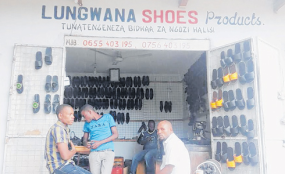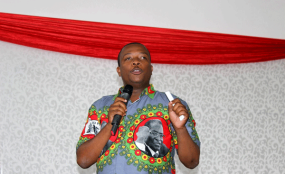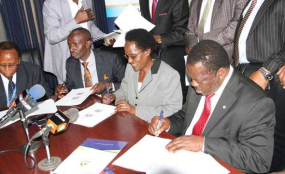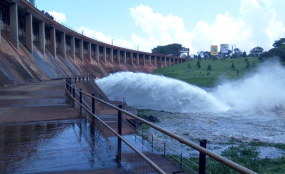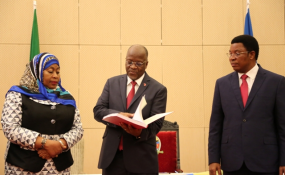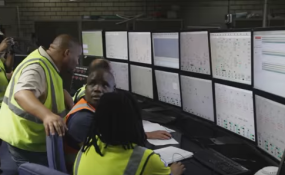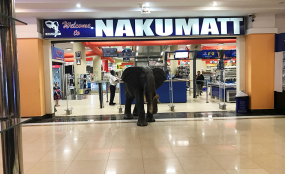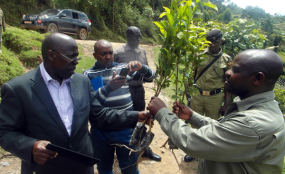ANALYSISBy Sauli Giliard and Emmanuel Mtengwa
Fadhili Mbwambo was among people who participated in last year’s Dar es Salaam International Trade Fair (DITF) famously known as saba saba. He didn’t participate as a shopper but as an exhibitor. It was an opportunity for him to promote his leather products.
The 37-year-old shoemaker says, “The 2016 fair was a good opportunity for I not only sold my products but I also received many business orders. Unfortunately I could not take all the orders due to lack of capacity to produce shoes in large quantities.”
The father of two does not have the required machines to help him produce enough shoes in a short time. He met a Kenyan trader during the trade fair who wanted to buy a large quantity of shoes but unfortunately, Mbwambo could not manage without modern shoe making machines.
“The Kenyan trader asked me if I was capable of making 100 pairs of shoes every day, but I was not in the position to do so,” Mbwambo recalls sadly. To him, this was an opportunity to penetrate the Nairobi market.
Using rudimentary tools at his workshop in Tabata-Aroma in Ilala District, Mbwambo can only make 30 pairs a day. To produce 100 pairs or more in a day, he needs a minimum of Sh10 million to buy the required machines.
“I can’t afford a leather cutting machine that costs Sh5 million, a shoes sewing machine that costs Sh3 million and a shoe sole pressing machine which is available for Sh2 million,” he says.
His main tools are a hammer, a pair of scissors, a knife and a shoe needle.
Apart from selling the shoes to ordinary customers, Mbwambo also receives orders from institutions such as the Agha Khan Hospital for staff shoes, a security company based in Dar es Salaam and some schools. He receives many school orders in January and June.
A long the Bima-Kimanga road is another shoemaker, Francis Adrian. As you approach his shoe factory, a mere three square metres room, one can hear the sound of a water pumping machine. The machine goes on and off several times before it finally comes to a stop. Then Adrian appears holding a pair of sandals. He tells me that he was using the water pumping machine to level the rough surface of the new sandals he has made.
“I use the rotating part of this water pump to make the rough surface of shoes or sandals smooth. I do so to make them look nice and attractive. I use the water pump because I cannot afford a shoe roughing machine ,” says Adrian.
Apart from using outdated technology in making shoes and sandals, the 42-year-old Adrian says the high cost of importing raw materials is another factor that is hindering the growth of the industry.
Unlike most shoe makers who learn the trade from older folks, Adrian received partial training from the United Nation’s Industry Development Organisation (UNIDO) in 2004 before dropping out due to illness. Adrian is concerned that despite the rise in the price of raw materials, the price of shoes has remained the same over the years. In 2004, when he started his small factory in Gongo la Mboto, in Ilala District, one square foot of leather cost Sh1,600. The price has gone up to Sh3,000 today.
“The wholesale price of a pair of sandals still stands at Sh8,000 today and Sh10,000 retail price.” The reason, he says is because Tanzanians prefer buying imported shoes than locally made ones. This is why shoemakers keep the price constant as a way of attracting customers.
A pair of shoe sole sells at Sh10,000 which is up from the Sh6, 000 old price. “The soles are usuallly imported from China,” says Adrian.
Like Mbwambo, Adrian, too can only produce 30 pairs maximum in a day. The reason? Poor technology and low capital.
The training challenge
When Mbwambo left Same District in Kilimanjaro Region to come to Dar es Salaam in 2002, he had no idea that shoe making would be his way of earning a living.
For nearly a decade, he worked as an assistant to a relative who used to own a small shoe making factory. His relative had trained at Peramiho Vocational Training Centre in Ruvuma Region.
“He used to run a small factory at Magomeni and so I used to help him with work for nearly 10 years. In the process, I too learnt how to make shoes,” he says.
Adrian too learnt the trade on the job. He used to help a friend at Manzese with work and earned a little money. He later attended UNIDO’s shoe making training which he could not complete. Adrian who has trained his two younger brothers to make shoes says most shoemakers in Dar es Salaam never attended formal training but they learnt from small factories like his. School fees becomes a hindrance most of the time.
Adrian’s younger brother, 31-year-old Xavery appeals to government to support shoe makers so they can compete in the East African market. He says as small -scale shoe makers they do not qualify for bank loans as they do not meet the conditions such as collateral.
EAC market potential
Mbwambo is among the 150 members of Tanzania Leather Products Producers Association (TALEPPA) who are likely to miss the opportunity to compete in the East African Community (EAC) market especially now that plans are under way to ban importation of second hand goods and leather products from overseas countries.
The ban aims to boost local manufacturing sectors in the region that will consequently increase job opportunities. To benefit from the ban, local leather products producers need capital to meet market demand.
Last year, the EAC community that now has six member states of Tanzania, Kenya, Uganda, Rwanda, Burundi and South Sudan, declared that by the end of 2019 there will be no importation of textile and shoes from outside EAC. Member States will be required to buy such goods or products within the market comprising of 150 million people.
The decision is underpinned by EAC common market protocol that guides, “the free movement of goods, people, labour, services and capital from one partner state to another as well as the rights of establishment and residence without restrictions.”
Despite the favourable decision, local shoemakers believe lack of capital, outdated technology and inadequate skills may hinder their penetration to the market. These, they say need to be addressed fast.
TALEPPA Secretary, Timothy Futo says with capital, TALEPPA members can equally compete with other producers in the EAC as they are capable of producing high quality products. He says it is difficult for local shoemakers to afford machines worth between Sh12 million and Sh30 million.
“Government should connect leather product producers with financial institutions or firms that make or supply machines so they can access loans easily,” he suggests.
If government invests in the sector, Futo believes it will help create a lot of jobs. He says government should build shoe factories including those manufacturing soles which are currently imported.
He points out that China products are killing the efforts of small-scale shoemakers. “While the Chinese counterparts are using advanced technology to produce quality products in large quantities, it’s a different story for Tanzanian shoemakers. Yet you expect them to compete in the same market.”
TALEPPA leader opined that the EAC decision to ban importation of leather products will benefit the sector only if government empowers local shoemakers to cover the anticipated deficit of leather products in the market. “Government should motivate all Tanzanians to love and use locally-made products.”
A light at the end of the tunnel
While shoemakers claim that government is not doing enough to empower them to compete in the local and East African markets, the Small Industry Development Organisation (Sido) director general, Prof Sylvester Mpanduji refutes the claim. He says government provides an enabling environment for accessing individual or group loans to purchase shoe machines.
“Yes, there are challenges in getting machines but we insist that they visit our offices to access low interest loans of a maximum of Sh5 million per individual,” says Prof Mpanduji. He adds that if someone needs from Sh10 million to Sh50 million, Sido can always link them to CRDB bank.
Other roles of Sido according to the director, include consultancy and training services to strengthen the competitive ability of small-scale industries.
Prof Mpanduji says in an effort to cut down unemployment, the Ministry of State in the Prime Minister’s Office responsible for policy, parliament, work, youth, employment and the disabled in collaboration with Dar es Salaam Institute of Technology has trained 1,000 youth on how to make leather products in Mwanza.
He calls upon established businesses to invest in shoemaking industries as the country is geared towards industrial economy.
The Prisons Department too in collaboration with the Parastatal Pensions Fund is constructing a new shoe factory at Karanga Prison in Moshi, Kilimanjaro. The factory that will use locally sourced raw materials will be completed by 2018.

